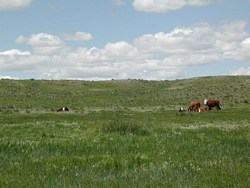
The Colorado Cattlemen’s Association (CCA) announced June 17 that the U.S. Forest Service, the Chaffee County Board of Commissioners, CCA, and most importantly – 13 livestock producing families – prevailed against a lawsuit filed by Western Watershed’s Project (WWP). In 2009, CCA and Chaffee County joined ranchers in protecting their right to multiple-use grazing of public lands by intervening in a lawsuit filed by the anti-livestock grazing WWP, which sought to deny renewal of grazing in the Pike and San Isabel National Forests.
“This is a huge win for our family and cattlemen in this part of the state,” stated Ken McMurry, grazing permittee. “Through the support of ChaffeeCounty, other local cattlemen’s associations and the Colorado Cattlemen’s Association, we’ve come to realize how significant this ruling is statewide to all cattlemen, whether grazing on private or public lands.”
The appeal by WWP objected to the renewal of the grazing permits, which had been approved after a thorough environmental review. The Forest Service grazing decision also incorporated adaptive management principles to improve environmental conditions in the forests. The ranchers and the Forest Service worked together to develop management steps that would address resource issues and still be cost-effective. Upon reviewing the briefs and the administrative record, the court affirmed the decision of the Forest Service and allows continued livestock grazing under the adaptive management that everyone committed to do.
As CCA counsel Connie Brooks explained, “This decision is especially significant because Western Watersheds had objected to the fact that the Forest Service had worked closely with the grazing permittees to develop management plans that made sense and would achieve the Forest Service’s objectives. While federal law calls for these grazing plans to be written in coordination with ranchers, this litigation would have undone the cooperation and consultation that has characterized the grazing program on the Salida Leadville Ranger District of the Pike San Isabel National Forest.”
Tim Canterbury and his family are also thrilled with the courts decision. “We are happy to see that the court ruled this way. It shows that the courts recognize all of the hard work the permittees and agencies put into the Environmental Assessment.”
The WWP argued that the decision made by the Forest Service was inconsistent with the Forest Plan; more specifically, it violated the Forest Plan in various ways including wildlife protection, protecting soil productivity, protecting water quality, and protecting archaeological resources. The court found that the Forest Service properly addressed each of these issues. Some of the measures included in the Proposed Plan were changing the stocking rate, limiting grazing to certain seasons, rest rotation, and active herding – all of which permittees will conduct to protect the public’s natural resources. After further review, the court strongly disagreed with WWP, stating the court may not assume that the Forest Service will fail to implement these actions in their Proposed Plan.
“The good guys won!,” exclaimed Chaffee County Commissioner Frank Holman. “The Western Watersheds Project is ignorant of the positive impact ranchers have on the land, and that these same ranchers leave the forest in an improved state. This verdict by the government keeps WWP from running over the little guy. This finally proves that cattlemen do not have to put up with invasions to our Western way of life.”
It’s also interesting that this story from the local newspaper, the Pueblo Chieftain mentions that WWP is from Idaho in the headline..
Grazing can continue in forests
Federal judge ruled against Idaho environmental group.
Curious reportage, that which leaves a whole side of the story left untold. Sort of leaves one, well, curious as to how, for instance, WWP feels about the USFS paradigm shift towards”collaboration” with “stakeholders” will ultimately serve the larger public’s best interests?
Is it a shift?
This of course, illustrated perfectly with Sharon’s reference to WWP being based outside of Colorado, as if state residency now determines one’s standing on matters of public lands which all present and future generations of Americans own (or will own, what’s left of it anyway).
There’s no real shift.
This leaves us all in the same predicament which preceded the New Century of Forest Planning, defining the excuses as to how mismanagement of public lands will process into the “new” century.
Until that side of the story gets told, we’ll never really fully understand where we’re headed.
David- I know the story was not balanced.. sometimes it’s hard to find one that is. I will post one on the same subject that you consider to be balanced, for balance.
I was just pointing out that the Pueblo Chieftain printed the origin of the WWP. It seems that this implies that the group would have had more legitimacy if it had been local. One might ask, why would that be? Why would a US NGO have less credibility than a local one in Bolivia? Here are some hypotheticals: lack of local knowledge, questionable motives (EAJA fees? ideologies?), and a feeling of intrusion (aren’t there enough grazing problems in Idaho to keep you occupied?).
It’s fine for WWP to want to stop grazing on public lands. It’s fine for them to use litigation as a tool. It’s fine for others to question this approach and to be happy when the courts agree that WWP’s arguments are invalid.
Others: here’s the WWP website. Note that they don’t have a field office in Colorado- maybe that would help reduce the “outsider” feeling.